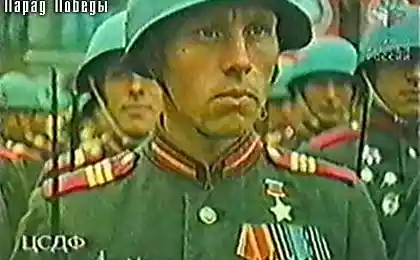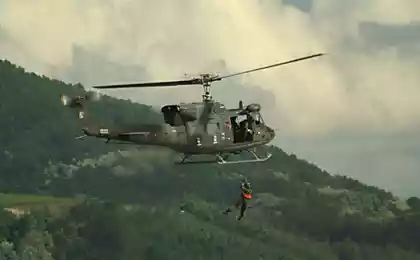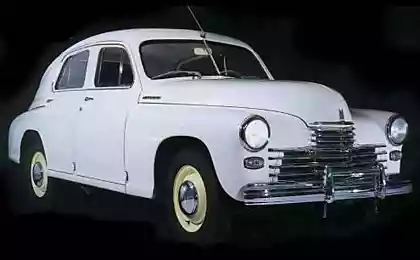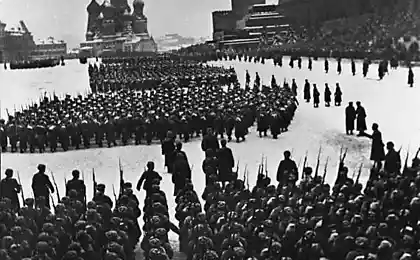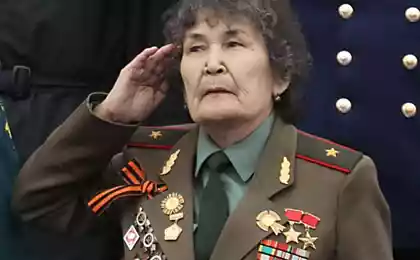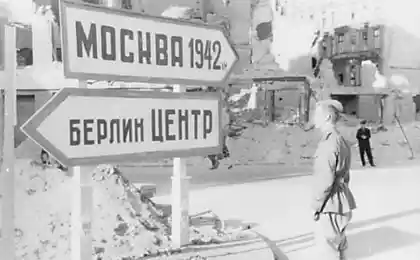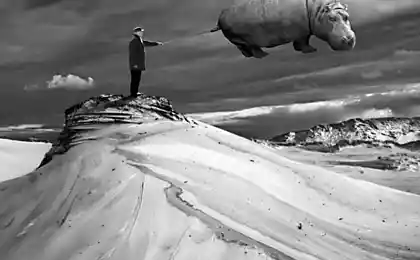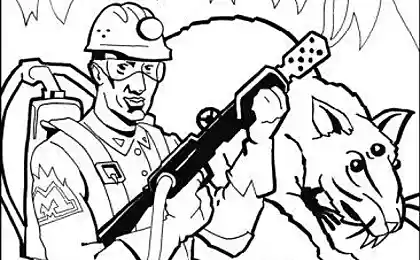1216
Marshals Victory (22 cards)
A selection of photos of commanders so-called "core team Pleiades WWII»
All taken with a wiki, or from other sites, prepared by May 9, but did not have time.
Let it be for today's Day of Memory and Sorrow
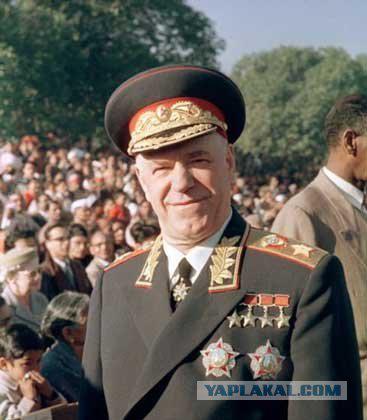
Georgy Zhukov. On it I will not write, I think everybody knows who is.
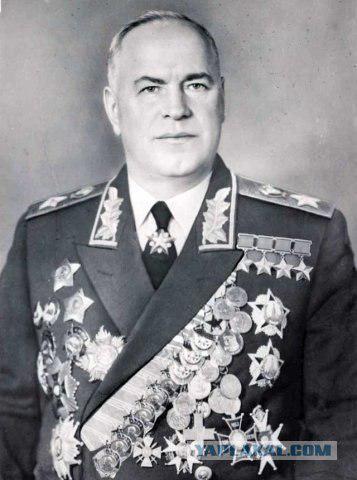
Baghramyan Bagramyan.
Born on November 20 (December 2), 1897 in the Karabakh settlement Chardakhlu (Chardakhly) Yelizavetpol province, near Yelizavetpol (now Shamkir region of Azerbaijan)
At the beginning of the Great Patriotic War - Operations Chief of Staff of the Southwestern Front, Head of Task Force South-West direction and the Chief of Staff of the Southwestern Front. From July 1942 commanded the army in November 1943 - the troops of the 1st Baltic Front (from March 1945 - the Samland Group of Forces), April 1945 - The troops of the 3rd Belorussian Front.
On the Samland task force troops were given the task of taking the city-fortress Koenigsberg called Hitler "completely impregnable bastion of the German spirit." The troops began the assault of Konigsberg April 6, 1945. To ensure a breakthrough powerful multiband defense rests on fundamental structures of urban forts, it was organized by its powerful suppression of a mass of artillery, including a very large caliber and bomboshturmovymi blows. On the capture of forts and other structures were well prepared strong assault group. Just three days after the assault began on April 9, Koenigsberg garrison commander, General Lasch, realizing that further resistance was futile, signed the act of unconditional surrender.
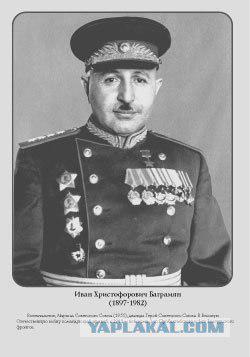
Vasilevsky Alexander
He was born, according to the register (Art. Style) September 16, 1895 in the village of New Golchikha Kineshma District (now became part of the city Vichuga Ivanovo region)
During the Great Patriotic War Vasilevsky as the Chief of General Staff (1942-1945) took an active part in the development and implementation of almost all major operations on the Soviet-German front. Since February 1945 commanded the 3rd Belorussian Front, led the assault of Koenigsberg. In 1945 Chief of Soviet troops in the Far East in the war with Japan. One of the greatest generals of World War II. One of the few officers of the tsarist army, who could make a brilliant career under the Soviets.
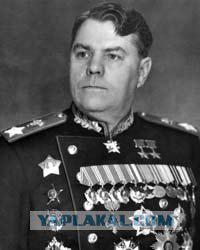
Rotmistrov Pavel
Pavel Rotmistrov born July 6, 1901 in the village now Skovorovo Selizharovsky district of Tver region in a large peasant family (had 8 brothers and sisters).
During the Great Patriotic War Rotmistrov at the front from the first day. Not over the formation of the division body had been thrown into the battle piecemeal and defeated the troops of the German 3rd Panzer Group, and the corps headquarters was surrounded by German troops. Rotmistrov with a group of soldiers and officers came out of the environment only 28 August 1941. In September 1941, Colonel Rotmistrov was appointed commander of the 8th Tank Brigade of the North-Western Front. In October, a team led heavy fighting with German forces captured the city of Kalinin. Then, as part of the Kalinin Front Brigade participated in a winter counter-offensive near Moscow, he distinguished himself during the liberation of Klin. In January 1942, a team of heroism personnel Guards received the flag and was called the 3rd Guards Tank Brigade. In August 1944, Rotmistrov was appointed deputy commander of the armored and mechanized forces of the Red Army until the end of the war in the fighting are no longer involved.
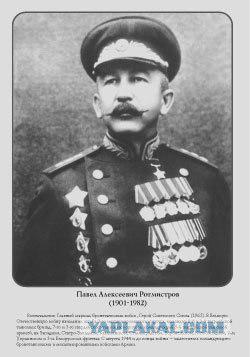
Antonov Antonov
Born 15 (28) September 1896 in Grodno (Belarus) in the family of an artillery officer.
The only military chief of the award of the Order of the "Victory" has not received the rank of marshal. During the Great Patriotic War, Antonov held from August 1941 as chief of staff of the Southern, North Caucasian and Transcaucasian Fronts and the Black Sea Group of Forces. From December 1942 - 1 st Deputy Chief of Staff (Wasilewski), and since February 1945 - Chief of General Staff. He took part in the Yalta and Potsdam conferences.
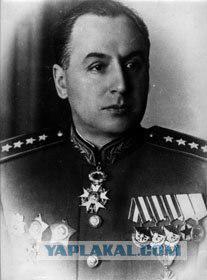
Rokossovsky Konstantin
According to a brief autobiography, written December 27, 1945, he was born in Great Luke (according to the questionnaire on 04.22.1920, in Warsaw.
Marshall without a homeland, as he called himself, "I'm Russian in Poland, in Russia, I am a Pole." Before the war, was arrested August 17, 1937 to 22 March 1940, under the help of 4 April 1940, it was held in the inner prison of the NKVD UGB in the Leningrad region in Shpalernaya street. However, in March 1940 he was released in connection with the termination of the case, when applying Timoshenko to Stalin and rehabilitated. Rokossovsky fully restore the rights in the Red Army positions in the party, spring spends with his family in the resort of Sochi. In the same year with the introduction of the rank of general in the Red Army assigned him the title of "Major-General." Again, commanding the 5th Cavalry Corps took part in the liberation campaign in Bessarabia. After the German invasion of the Soviet Union commanded the 9th Mechanized Corps in the Battle of Dubno-Lutsk-Brody. Despite the shortage of tanks and trucks, 9 mechanized corps troops during June-July 1941 active defense wore down the enemy, retreating only when ordered. He participated in the battles of Stalingrad and Kursk.
After the war, he was appointed defense minister of Poland.
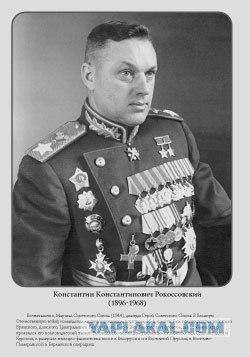
Rodion Malinovsky
Born November 23, 1898 in Odessa. War met as commander of the 48th Infantry Corps IN Odessa, located in the Moldovan city of Balti. At the beginning of the war, despite the retreat, he managed to keep the main force of his body and showed good commanding skills. From August 1941 he commanded the 6th Army, and in December 1941 was appointed commander of the Southern Front. In July 1942, Malinowski was removed from his post and appointed commander of the front down the commander of the 66th Army north of Stalingrad. Proactive action Malinowski and heroism of the army led by him played an important role in the victory in Kotelnikovo operation and as a consequence - in the victory in the Battle of Stalingrad. As a result of Stalin Malinowski returned to the post commander of the Southern Front in February 1943. In the spring of 1945 in conjunction with the forces FI Tolbukhina front Malinowski successfully conducted the Vienna operation, essentially eliminating the German front in Austria and is connected to the Allied forces. For the complete destruction of enemy forces in this operation Malinowski awarded the highest Soviet generalship Order "Victory».
The Great Patriotic War in Austria and Czechoslovakia, Malinovsky was transferred to the Far East, where the Soviet-Japanese War, assumed command of the Trans-Baikal Front; Front unexpectedly Japanese commanders broke through the Gobi Desert in the central part of Manchuria, completed the encirclement and complete defeat of Japanese troops. Malinowski was awarded the title Hero of the Soviet Union.
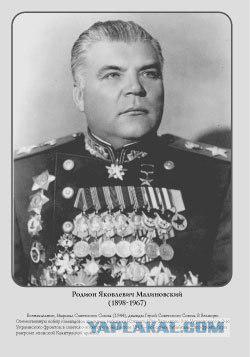
Leonid Govorov
Leonid Govorov was born 10 (Feb. 22) in 1897 to a peasant family in the village of Butyrki Yaransk County Vyatka province (now the Kirov region).
In May 1941, a month before the start of the war, he led the Artillery Academy. Dzerzhinsky. On the first day of the Great Patriotic War is located on the Western Front, where serves as the Chief of Artillery of the Western strategic direction. At the end of October, he says starts to develop operations. From November 25 to begin preparations for the upcoming parts of the front fighting. December 2 plan of operation, dubbed "Spark", was approved by the Supreme Command. The purpose of the operation - countered Leningrad and Volkhov fronts to cut the enemy's forces in the area Sinyavino ridge, south of Lake Ladoga to connect and break the blockade of Leningrad. January 12 began an offensive operation of the Leningrad and Volkhov Fronts, and January 18 Soviet troops entered the compound, the blockade was broken. On January 27, Leningrad was made fireworks to celebrate the final lifting of the blockade, and an order signed by the victorious forces, contrary to the established order, not Stalin, and speak. Such a privilege did not get one of the commanders of the Great Patriotic War. Directing in 1945, the actions of the Soviet front against Kurland grouping of German troops, Govorov knowingly waives active hostilities in favor of the blockade surrounded by the enemy. May 8th Army Group "Courland" accepted the conditions of the Soviet ultimatum to surrender.
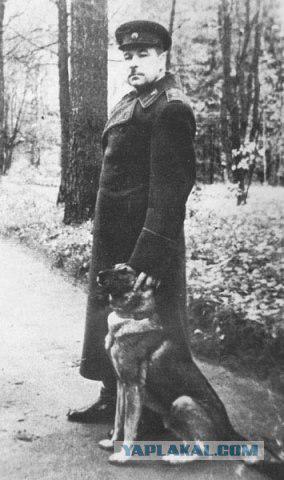
Fedor Tolbukhin
Born June 16, 1894 in the village of Androniki Yaroslavl province (now Yaroslavl region Yaroslavl region) into a peasant family.
A great commander and staff officer. Since March 1943 Tolbukhin commanded the troops of the South (converted 20 October 1943 in the 4th Ukrainian Front) and in May 1944 - the 3rd Ukrainian Front. On September 12, 1944 - Marshal of the Soviet Union. Supervised army troops in the Battle of Stalingrad, participated in the liberation of Romania, Bulgaria, Yugoslavia, Hungary, Austria. Since September 1944 - Chairman of the Allied Control Commission in Bulgaria. Mainly engaged in the work of the staff, so a record he mainly staff positions. After the war, Marshal Tolbukhin - Chief of the Southern Group of Forces in the territory of Romania and Bulgaria. From January 1947 - the commander of the Transcaucasus Military District.
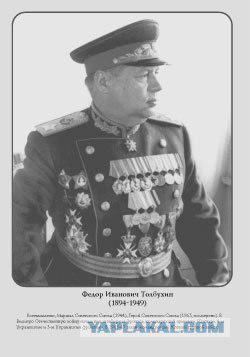
Eremenko Andrei Ivanovich
Born October 14, 1892, p. Markovka now Luhansk region.
Eight days after the war began Eremenko summoned to Moscow, where he was appointed commander of the western front, after the previous command - Army General DG Pavlov was removed from his command and soon shot. Eremenko front led to the arrival of Marshal Timoshenko, then appointed deputy commander of the front. In December 1941, Yeremenko was appointed commander of the Fourth Shock Army, which was part of the North-Western Front and Kalinin Front and took part in the counter-offensive of the Soviet troops near Moscow. There the troops of his army reached, perhaps the best results in the winter offensive in 1942 - had been breached defenses of the enemy, for the month of fighting the enemy was driven 250 kilometers, exempted the city Andreapol, Toropets, Velizh, swept north Rzhevskaya enemy force and the south - Velikolukskaya group. In the Baltic operations in the autumn of 1944, troops of the 2nd Baltic Front attacked on Riga, driving heavy fighting on numerous defensive lines with significant losses. Only after the success of the troops of the neighboring front General Bagramyan, who managed to break through to the Baltic Sea and block 30 German divisions in Latvia, the troops were able to liberate Eremenko Riga. March 26, 1945 Eremenko transferred to the post of commander of the 4th Ukrainian Front, which he commanded until the end of the war. The troops acted in front of the eastern Czechoslovakia. In this post Eremenko spent the Moravian-Ostrava operation, during which were released Slovakia and eastern parts of the Czech Republic. The victory of his troops met on the eastern outskirts of Prague. In the Czech Republic are still some streets bear his name. After the war, Eremenko has held three important positions: in 1945-1946 he was the commander of the Carpathian Military District, in the years 1946-1953 - the commander of the West Siberian Military District in the years 1953-1958 - the commander of the North Caucasian Military District.
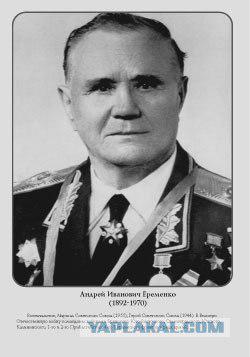
Meretskov Cyril Afanasievich
Born on June 7, 1897, the village Nazarevo Moscow province.
On the second day of the war on June 23, 1941, he was arrested and subjected to long interrogations and abuse; He was charged with a military conspiracy with GM Stern later DG Pavlov and others. In contrast to these warlords, Meretskov was immediately sentenced to death, and at the critical moment of the war (September 1941), after a personal appeal to Stalin released. Subsequently performed a witness in the investigation of the crimes of the NKVD under Khrushchev in the 1950s. Later during the Great Patriotic War, commanded the 7th Army, and then groups of troops and a number of fronts in the northern direction (from December 1941 to February 1944 - Volkhov, until the end of the war - Karelian). He participated in the unblocking of Leningrad (Operation "Spark"). He finished the war in Norway. One of the Liberators of Leningrad and the commander who built the Finns sweet life.
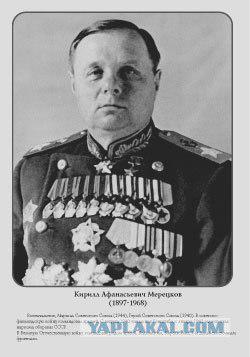
Pavel Rybalko Semenovich
Born on November 4 (October 23) in 1894 in a family of factory workers in the village Small Istorop now Lebedinsky district of Sumy region of Ukraine.
In 1934 - 1936 he was a military advisor in China ("Russian general of the Chinese service") in the fight against Uighur insurgents Ma Zhongyin in the Chinese province of Xinjiang, while under the pseudonym Fu-Ji-Hui. In 1937 - 1940 served as military attache in Poland and China, and then moved to a teaching job. During the Great Patriotic War, after repeated reports asking for direction to the front in July 1942 commanded the 5 th (June 1942), 3rd (from October. 1942) and the 3rd Guards (May 1943) tank armies, participated in many military operations, including in offensive operations in the area of Kiev, Zhitomir, Proskurov, Lvov, Berlin, Dresden, Prague. Panzer Army Rybalko during the Lvov-Sandomierz operation Lions saved from destruction.
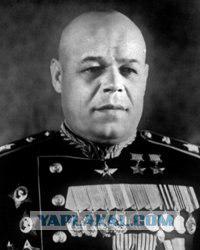
Timoshenko Semyon Konstantinovich
Born on 6 (18) February 1895 in the village of Furmanka Akkerman county province of Bessarabia (now Furmanivka Kiliya district of Odessa region of Ukraine)
In the first month of the Great Patriotic War Marshal (1940) Tymoshenko was chairman of the High Command. After the formation of the Supreme Command under the leadership of Stalin Tymoshenko has been relieved of his duties Commissar and 2 July was appointed commander of the western direction and the commander of the Western Front. In heavy fighting near Smolensk in July-September 1941, the troops of the Western Front suffered heavy losses in September Timoshenko was appointed commander in chief of the South-West direction. In November 1941 Tymoshenko commanded the counter-offensive near Rostov-on-Don. November 28 the city was taken, that was one of the first victories of the Red Army in 1941. In May 1942, Tymoshenko led the Kharkov operation, which resulted in a large group of Red Army suffered a crushing defeat. As a result, the environment near Kharkov were taken prisoner more than 200 thousand soldiers and officers of the Red Army. Himself Tymoshenko survived and escaped captivity. In July 1942 Tymoshenko was appointed commander of the Stalingrad front, then the North-West. From March 1943 until the end of the war was the representative of the Supreme Command and coordinated the actions of a number of fronts, participated in the design and implementation of some operations
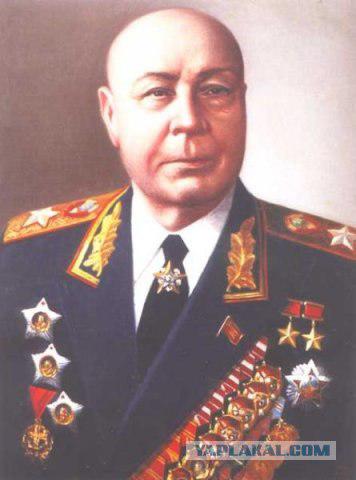
Ivan Stepanovich Konev
Born December 28, 1897 in the village now Lodeynoe Podosinovsky District Kirov region
Great Patriotic War, Lieutenant-General Konev began the commander of the 19th Army. He commanded the Western Front (September - October 1941), which suffered a heavy defeat at Vyazma; trial and execution of Konev rescued Zhukov. Later commanded fronts: Kalinin (October 1941 - August 1942), again the West (August 1942 - February 1943), the North-West (March 1943), Steppe (July 1943), the 2nd Ukrainian (October 1943) and 1st Ukrainian (May 1944-May 1945). As commander of the Kalinin Front was successfully operated during the counter-offensive near Moscow. In the battle of Kursk, Konev's Steppe Front troops liberated Belgorod and Kharkov. In January 1945, troops of the front as a result of the rapid impact and outflanking maneuver prevented the retreating enemy to destroy the industry of Silesia, which had great economic importance for Poland friendly. Konev's forces took part in the Berlin operation and in the liberation of Prague.
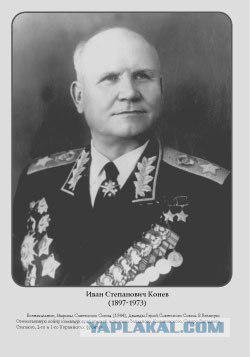
Boris Shaposhnikov
Born on October 2 (September 20) 1882 Chrysostom.
At the beginning of the Great Patriotic War from June 23 to July 16 in the Council for evacuation in SNK. From July 10 - a member of the Supreme Command. From 21 to 30 July 1941 - the chief of staff of the Commander in Chief West. From July 29 the newly appointed chief of the General Staff of the Red Army. With his direct participation were developed proposals for the design and management of major operations of the Soviet troops in 1941-1942 .: retreat in 1941, Battle of Smolensk, offensive and general offensive of the Red Army in the winter of 1941-1942. May 11, 1942 in this position he was succeeded by Vasilevsky. From May 1942 to June 1943 - Deputy People's Commissar of Defence of the USSR. In June 1943 he was appointed head of the Military Academy of the General Staff.
All.
Source:
All taken with a wiki, or from other sites, prepared by May 9, but did not have time.
Let it be for today's Day of Memory and Sorrow

Georgy Zhukov. On it I will not write, I think everybody knows who is.

Baghramyan Bagramyan.
Born on November 20 (December 2), 1897 in the Karabakh settlement Chardakhlu (Chardakhly) Yelizavetpol province, near Yelizavetpol (now Shamkir region of Azerbaijan)
At the beginning of the Great Patriotic War - Operations Chief of Staff of the Southwestern Front, Head of Task Force South-West direction and the Chief of Staff of the Southwestern Front. From July 1942 commanded the army in November 1943 - the troops of the 1st Baltic Front (from March 1945 - the Samland Group of Forces), April 1945 - The troops of the 3rd Belorussian Front.
On the Samland task force troops were given the task of taking the city-fortress Koenigsberg called Hitler "completely impregnable bastion of the German spirit." The troops began the assault of Konigsberg April 6, 1945. To ensure a breakthrough powerful multiband defense rests on fundamental structures of urban forts, it was organized by its powerful suppression of a mass of artillery, including a very large caliber and bomboshturmovymi blows. On the capture of forts and other structures were well prepared strong assault group. Just three days after the assault began on April 9, Koenigsberg garrison commander, General Lasch, realizing that further resistance was futile, signed the act of unconditional surrender.

Vasilevsky Alexander
He was born, according to the register (Art. Style) September 16, 1895 in the village of New Golchikha Kineshma District (now became part of the city Vichuga Ivanovo region)
During the Great Patriotic War Vasilevsky as the Chief of General Staff (1942-1945) took an active part in the development and implementation of almost all major operations on the Soviet-German front. Since February 1945 commanded the 3rd Belorussian Front, led the assault of Koenigsberg. In 1945 Chief of Soviet troops in the Far East in the war with Japan. One of the greatest generals of World War II. One of the few officers of the tsarist army, who could make a brilliant career under the Soviets.

Rotmistrov Pavel
Pavel Rotmistrov born July 6, 1901 in the village now Skovorovo Selizharovsky district of Tver region in a large peasant family (had 8 brothers and sisters).
During the Great Patriotic War Rotmistrov at the front from the first day. Not over the formation of the division body had been thrown into the battle piecemeal and defeated the troops of the German 3rd Panzer Group, and the corps headquarters was surrounded by German troops. Rotmistrov with a group of soldiers and officers came out of the environment only 28 August 1941. In September 1941, Colonel Rotmistrov was appointed commander of the 8th Tank Brigade of the North-Western Front. In October, a team led heavy fighting with German forces captured the city of Kalinin. Then, as part of the Kalinin Front Brigade participated in a winter counter-offensive near Moscow, he distinguished himself during the liberation of Klin. In January 1942, a team of heroism personnel Guards received the flag and was called the 3rd Guards Tank Brigade. In August 1944, Rotmistrov was appointed deputy commander of the armored and mechanized forces of the Red Army until the end of the war in the fighting are no longer involved.

Antonov Antonov
Born 15 (28) September 1896 in Grodno (Belarus) in the family of an artillery officer.
The only military chief of the award of the Order of the "Victory" has not received the rank of marshal. During the Great Patriotic War, Antonov held from August 1941 as chief of staff of the Southern, North Caucasian and Transcaucasian Fronts and the Black Sea Group of Forces. From December 1942 - 1 st Deputy Chief of Staff (Wasilewski), and since February 1945 - Chief of General Staff. He took part in the Yalta and Potsdam conferences.

Rokossovsky Konstantin
According to a brief autobiography, written December 27, 1945, he was born in Great Luke (according to the questionnaire on 04.22.1920, in Warsaw.
Marshall without a homeland, as he called himself, "I'm Russian in Poland, in Russia, I am a Pole." Before the war, was arrested August 17, 1937 to 22 March 1940, under the help of 4 April 1940, it was held in the inner prison of the NKVD UGB in the Leningrad region in Shpalernaya street. However, in March 1940 he was released in connection with the termination of the case, when applying Timoshenko to Stalin and rehabilitated. Rokossovsky fully restore the rights in the Red Army positions in the party, spring spends with his family in the resort of Sochi. In the same year with the introduction of the rank of general in the Red Army assigned him the title of "Major-General." Again, commanding the 5th Cavalry Corps took part in the liberation campaign in Bessarabia. After the German invasion of the Soviet Union commanded the 9th Mechanized Corps in the Battle of Dubno-Lutsk-Brody. Despite the shortage of tanks and trucks, 9 mechanized corps troops during June-July 1941 active defense wore down the enemy, retreating only when ordered. He participated in the battles of Stalingrad and Kursk.
After the war, he was appointed defense minister of Poland.

Rodion Malinovsky
Born November 23, 1898 in Odessa. War met as commander of the 48th Infantry Corps IN Odessa, located in the Moldovan city of Balti. At the beginning of the war, despite the retreat, he managed to keep the main force of his body and showed good commanding skills. From August 1941 he commanded the 6th Army, and in December 1941 was appointed commander of the Southern Front. In July 1942, Malinowski was removed from his post and appointed commander of the front down the commander of the 66th Army north of Stalingrad. Proactive action Malinowski and heroism of the army led by him played an important role in the victory in Kotelnikovo operation and as a consequence - in the victory in the Battle of Stalingrad. As a result of Stalin Malinowski returned to the post commander of the Southern Front in February 1943. In the spring of 1945 in conjunction with the forces FI Tolbukhina front Malinowski successfully conducted the Vienna operation, essentially eliminating the German front in Austria and is connected to the Allied forces. For the complete destruction of enemy forces in this operation Malinowski awarded the highest Soviet generalship Order "Victory».
The Great Patriotic War in Austria and Czechoslovakia, Malinovsky was transferred to the Far East, where the Soviet-Japanese War, assumed command of the Trans-Baikal Front; Front unexpectedly Japanese commanders broke through the Gobi Desert in the central part of Manchuria, completed the encirclement and complete defeat of Japanese troops. Malinowski was awarded the title Hero of the Soviet Union.

Leonid Govorov
Leonid Govorov was born 10 (Feb. 22) in 1897 to a peasant family in the village of Butyrki Yaransk County Vyatka province (now the Kirov region).
In May 1941, a month before the start of the war, he led the Artillery Academy. Dzerzhinsky. On the first day of the Great Patriotic War is located on the Western Front, where serves as the Chief of Artillery of the Western strategic direction. At the end of October, he says starts to develop operations. From November 25 to begin preparations for the upcoming parts of the front fighting. December 2 plan of operation, dubbed "Spark", was approved by the Supreme Command. The purpose of the operation - countered Leningrad and Volkhov fronts to cut the enemy's forces in the area Sinyavino ridge, south of Lake Ladoga to connect and break the blockade of Leningrad. January 12 began an offensive operation of the Leningrad and Volkhov Fronts, and January 18 Soviet troops entered the compound, the blockade was broken. On January 27, Leningrad was made fireworks to celebrate the final lifting of the blockade, and an order signed by the victorious forces, contrary to the established order, not Stalin, and speak. Such a privilege did not get one of the commanders of the Great Patriotic War. Directing in 1945, the actions of the Soviet front against Kurland grouping of German troops, Govorov knowingly waives active hostilities in favor of the blockade surrounded by the enemy. May 8th Army Group "Courland" accepted the conditions of the Soviet ultimatum to surrender.

Fedor Tolbukhin
Born June 16, 1894 in the village of Androniki Yaroslavl province (now Yaroslavl region Yaroslavl region) into a peasant family.
A great commander and staff officer. Since March 1943 Tolbukhin commanded the troops of the South (converted 20 October 1943 in the 4th Ukrainian Front) and in May 1944 - the 3rd Ukrainian Front. On September 12, 1944 - Marshal of the Soviet Union. Supervised army troops in the Battle of Stalingrad, participated in the liberation of Romania, Bulgaria, Yugoslavia, Hungary, Austria. Since September 1944 - Chairman of the Allied Control Commission in Bulgaria. Mainly engaged in the work of the staff, so a record he mainly staff positions. After the war, Marshal Tolbukhin - Chief of the Southern Group of Forces in the territory of Romania and Bulgaria. From January 1947 - the commander of the Transcaucasus Military District.

Eremenko Andrei Ivanovich
Born October 14, 1892, p. Markovka now Luhansk region.
Eight days after the war began Eremenko summoned to Moscow, where he was appointed commander of the western front, after the previous command - Army General DG Pavlov was removed from his command and soon shot. Eremenko front led to the arrival of Marshal Timoshenko, then appointed deputy commander of the front. In December 1941, Yeremenko was appointed commander of the Fourth Shock Army, which was part of the North-Western Front and Kalinin Front and took part in the counter-offensive of the Soviet troops near Moscow. There the troops of his army reached, perhaps the best results in the winter offensive in 1942 - had been breached defenses of the enemy, for the month of fighting the enemy was driven 250 kilometers, exempted the city Andreapol, Toropets, Velizh, swept north Rzhevskaya enemy force and the south - Velikolukskaya group. In the Baltic operations in the autumn of 1944, troops of the 2nd Baltic Front attacked on Riga, driving heavy fighting on numerous defensive lines with significant losses. Only after the success of the troops of the neighboring front General Bagramyan, who managed to break through to the Baltic Sea and block 30 German divisions in Latvia, the troops were able to liberate Eremenko Riga. March 26, 1945 Eremenko transferred to the post of commander of the 4th Ukrainian Front, which he commanded until the end of the war. The troops acted in front of the eastern Czechoslovakia. In this post Eremenko spent the Moravian-Ostrava operation, during which were released Slovakia and eastern parts of the Czech Republic. The victory of his troops met on the eastern outskirts of Prague. In the Czech Republic are still some streets bear his name. After the war, Eremenko has held three important positions: in 1945-1946 he was the commander of the Carpathian Military District, in the years 1946-1953 - the commander of the West Siberian Military District in the years 1953-1958 - the commander of the North Caucasian Military District.

Meretskov Cyril Afanasievich
Born on June 7, 1897, the village Nazarevo Moscow province.
On the second day of the war on June 23, 1941, he was arrested and subjected to long interrogations and abuse; He was charged with a military conspiracy with GM Stern later DG Pavlov and others. In contrast to these warlords, Meretskov was immediately sentenced to death, and at the critical moment of the war (September 1941), after a personal appeal to Stalin released. Subsequently performed a witness in the investigation of the crimes of the NKVD under Khrushchev in the 1950s. Later during the Great Patriotic War, commanded the 7th Army, and then groups of troops and a number of fronts in the northern direction (from December 1941 to February 1944 - Volkhov, until the end of the war - Karelian). He participated in the unblocking of Leningrad (Operation "Spark"). He finished the war in Norway. One of the Liberators of Leningrad and the commander who built the Finns sweet life.

Pavel Rybalko Semenovich
Born on November 4 (October 23) in 1894 in a family of factory workers in the village Small Istorop now Lebedinsky district of Sumy region of Ukraine.
In 1934 - 1936 he was a military advisor in China ("Russian general of the Chinese service") in the fight against Uighur insurgents Ma Zhongyin in the Chinese province of Xinjiang, while under the pseudonym Fu-Ji-Hui. In 1937 - 1940 served as military attache in Poland and China, and then moved to a teaching job. During the Great Patriotic War, after repeated reports asking for direction to the front in July 1942 commanded the 5 th (June 1942), 3rd (from October. 1942) and the 3rd Guards (May 1943) tank armies, participated in many military operations, including in offensive operations in the area of Kiev, Zhitomir, Proskurov, Lvov, Berlin, Dresden, Prague. Panzer Army Rybalko during the Lvov-Sandomierz operation Lions saved from destruction.

Timoshenko Semyon Konstantinovich
Born on 6 (18) February 1895 in the village of Furmanka Akkerman county province of Bessarabia (now Furmanivka Kiliya district of Odessa region of Ukraine)
In the first month of the Great Patriotic War Marshal (1940) Tymoshenko was chairman of the High Command. After the formation of the Supreme Command under the leadership of Stalin Tymoshenko has been relieved of his duties Commissar and 2 July was appointed commander of the western direction and the commander of the Western Front. In heavy fighting near Smolensk in July-September 1941, the troops of the Western Front suffered heavy losses in September Timoshenko was appointed commander in chief of the South-West direction. In November 1941 Tymoshenko commanded the counter-offensive near Rostov-on-Don. November 28 the city was taken, that was one of the first victories of the Red Army in 1941. In May 1942, Tymoshenko led the Kharkov operation, which resulted in a large group of Red Army suffered a crushing defeat. As a result, the environment near Kharkov were taken prisoner more than 200 thousand soldiers and officers of the Red Army. Himself Tymoshenko survived and escaped captivity. In July 1942 Tymoshenko was appointed commander of the Stalingrad front, then the North-West. From March 1943 until the end of the war was the representative of the Supreme Command and coordinated the actions of a number of fronts, participated in the design and implementation of some operations

Ivan Stepanovich Konev
Born December 28, 1897 in the village now Lodeynoe Podosinovsky District Kirov region
Great Patriotic War, Lieutenant-General Konev began the commander of the 19th Army. He commanded the Western Front (September - October 1941), which suffered a heavy defeat at Vyazma; trial and execution of Konev rescued Zhukov. Later commanded fronts: Kalinin (October 1941 - August 1942), again the West (August 1942 - February 1943), the North-West (March 1943), Steppe (July 1943), the 2nd Ukrainian (October 1943) and 1st Ukrainian (May 1944-May 1945). As commander of the Kalinin Front was successfully operated during the counter-offensive near Moscow. In the battle of Kursk, Konev's Steppe Front troops liberated Belgorod and Kharkov. In January 1945, troops of the front as a result of the rapid impact and outflanking maneuver prevented the retreating enemy to destroy the industry of Silesia, which had great economic importance for Poland friendly. Konev's forces took part in the Berlin operation and in the liberation of Prague.

Boris Shaposhnikov
Born on October 2 (September 20) 1882 Chrysostom.
At the beginning of the Great Patriotic War from June 23 to July 16 in the Council for evacuation in SNK. From July 10 - a member of the Supreme Command. From 21 to 30 July 1941 - the chief of staff of the Commander in Chief West. From July 29 the newly appointed chief of the General Staff of the Red Army. With his direct participation were developed proposals for the design and management of major operations of the Soviet troops in 1941-1942 .: retreat in 1941, Battle of Smolensk, offensive and general offensive of the Red Army in the winter of 1941-1942. May 11, 1942 in this position he was succeeded by Vasilevsky. From May 1942 to June 1943 - Deputy People's Commissar of Defence of the USSR. In June 1943 he was appointed head of the Military Academy of the General Staff.
All.
Source:

